Predominant Normative Ethical Theories
- Consequentialist Theory.
- Deontological Theory.
- Virtue Ethics.
Ethical theories serve as the basis for guiding principles which are used by a person while making decisions. Ethical principles are rooted in the ethical theories, and ethicists, when trying to explain a particular action, usually refer to the principles, rather than theories. Thus, the basic ethical theories which are used by the ethicists today are Consequentialist, Deontological, and Virtue Theory (of Virtue Ethics).
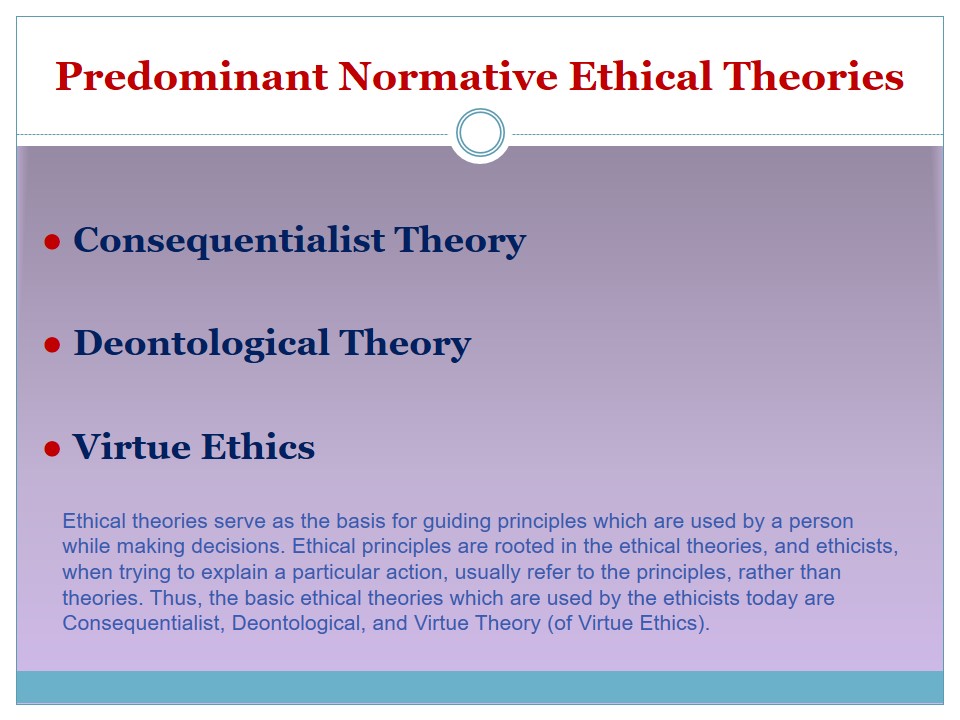
Consequentialist Ethical Theory
“The rightness or goodness of an action is based on its potential consequences” (DeRenzo & Moss, 2006, p. 20).
Sub-theories:
- Utilitarianism.
- Ethical egoism and altruism.
- Rule consequentialism.
- Negative consequentialism.
- Teleological ethics.
- Utilitarianism – people’s interests predominate over their fears and are realized in accordance with their attitude towards consequences. At this, happiness is the best possible outcome.
- Ethical egoism and altruism – in case of ethical egoism, consequences of the actions are considered to be good if they bring benefits to the agent; in case with altruism, everyone benefits except for the agent.
- Rule consequentialism – serves as a reconciliation of consequentialism and deontology; this theory claims that moral behavior is all about following a definite set of rules.
- Negative consequentialism – focuses on minimizing bad consequences and promotion of the good ones.
- Teleological ethics – is based on the belief that the consequences of the action determine whether it is bad or good.
According to this theory, the actions which maximize the good they bring are the most praiseworthy. Apart from defining which actions are right and which are wrong, consequentialism also addresses such issues as the nature of good consequences, the primary beneficiary of an action, and judging of the consequences.
These theories serve as varieties of consequentialism; they concentrate on the common idea that consequences should be borne in mind when committing an action.
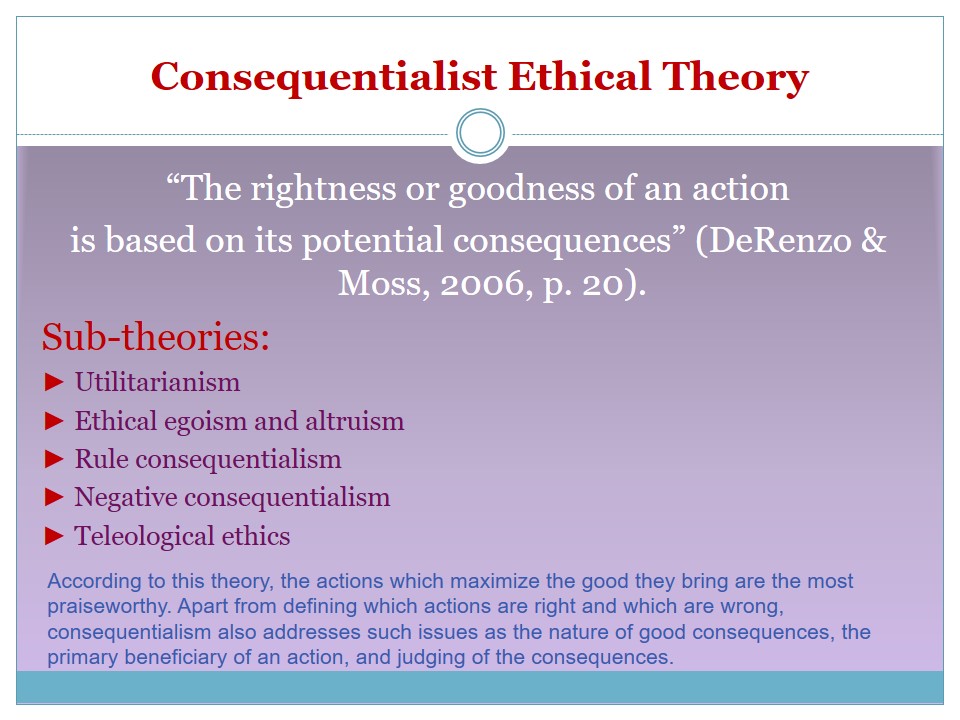
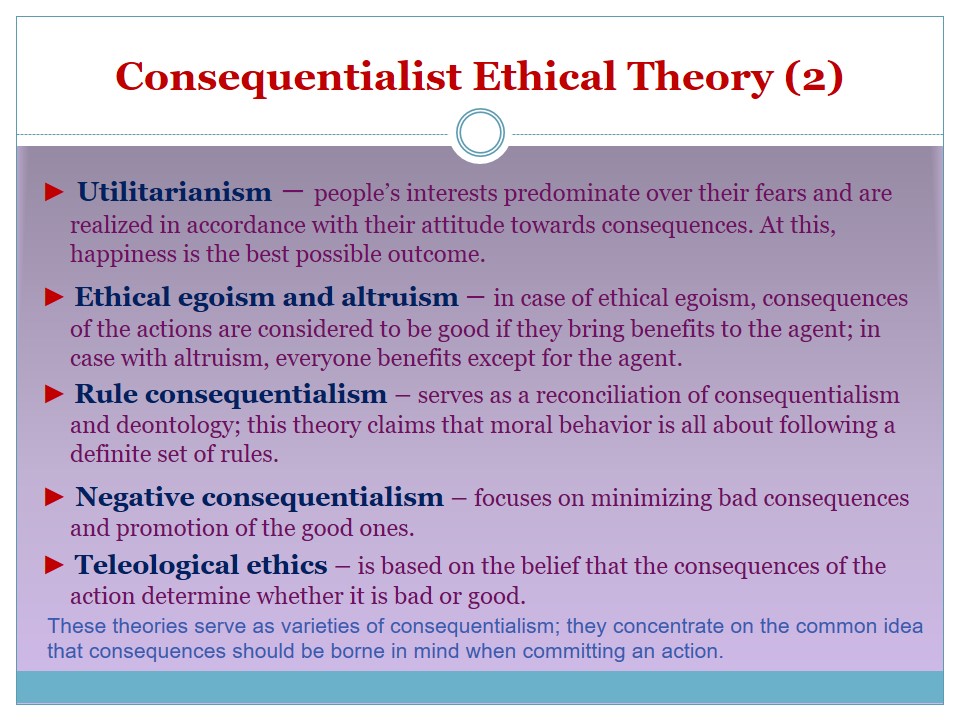
Deontological Ethical Theory
“The rightness or goodness of an action is based on the degree to which a person meets his or her duties and obligations” (DeRenzo & Moss, 2006, p. 22).
Sub-theories:
- The Divine Command Theory – “makes morality rest on God’s will” (Wainwright, 2005, p. 356).
- Non-Aggression Principle – initiation of force is immoral in any case.
Deontological ethical theory states that certain actions may be wrong even if they bring good consequences. Immanuel Kant, one of the supporters of this theory, believed that lying is bad in all the cases, including those when a person who lies has good intentions (he asserted that it is bad to lie to a murderer who asks of his victim’s location). However, Kant was a moral absolutist; non-absolute deontologists (such as W.D. Ross) justify lie if it brings something good.
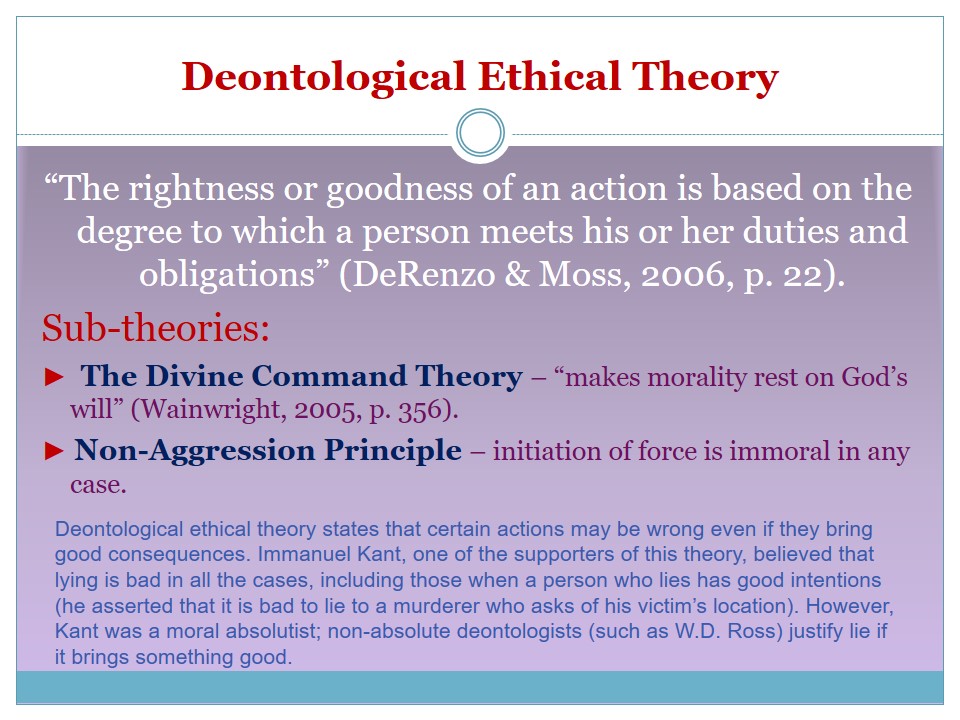
Virtue Ethics
“The rightness or goodness of an action is based on the character of the person performing the action” (DeRenzo & Moss, 2006, p. 23).
- Eudemonia.
- Moral virtues.
- Intellectual virtues.
- Cardinal virtues.
According to the Virtue Theory, character of a person is a key element of the critical thinking. As stated by Aristotle, the virtue ethics can be characterized by eudemonia (or happiness which is the basic goal of every human being), moral virtues (such as courage, generosity, modesty, temperance, patience, friendliness, wittiness, etc.), intellectual values (knowledge, wisdom, understanding, judgment, intuition, common sense, practical skill), and cardinal virtues (temperance, justice, wisdom, and courage).
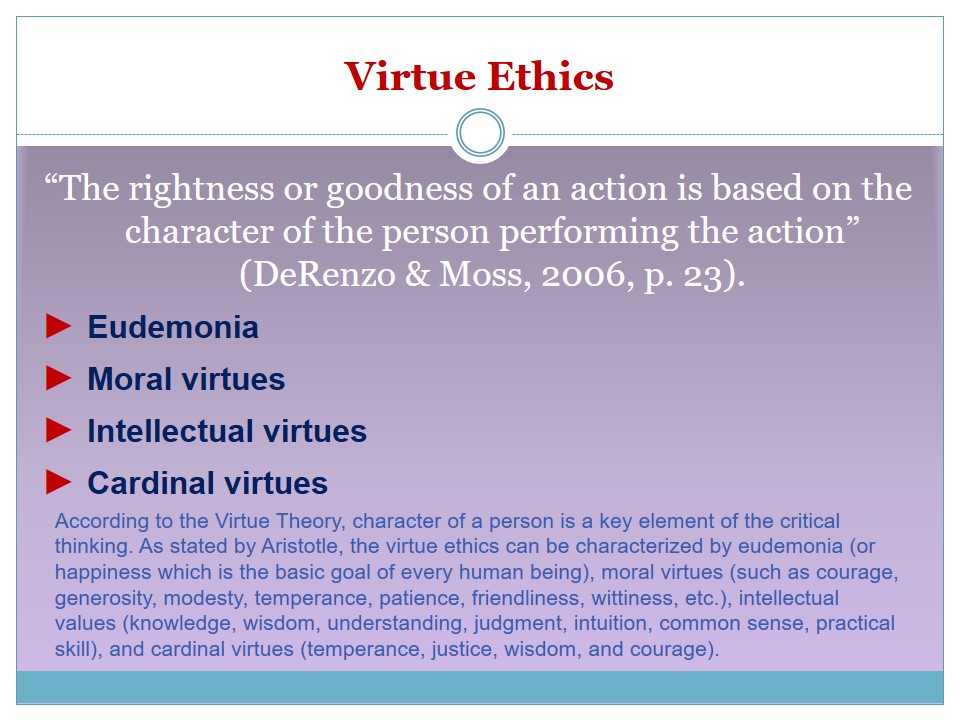
Ethics Theories
- Duty-based Ethics.
- Goal-based Ethics.
- Rights-based Ethics.
- Human nature Ethics.
These are the varieties of ethics theories. Three of them, duty-based, goal-based, and right-based ethics form three approaches to making moral decisions. At this, goal-based morality can be regarded as consequentialist, while duty- and right-based moralities are deontological (for they take into account only the content of the action without paying attention to its consequences). The main principle of the duty-based morality is for the action to conform to certain moral principles which are right irrespective of the situation. Right-based morality, in its turn, “considers wishes and concerns of those affected by the action … in terms of their views on the content of the action” (Foster, 2001, p.133). As far as Human Nature Ethics is concerned, there are no main principles or typology of it for human nature is individual and it varies depending on the person’s inner character.
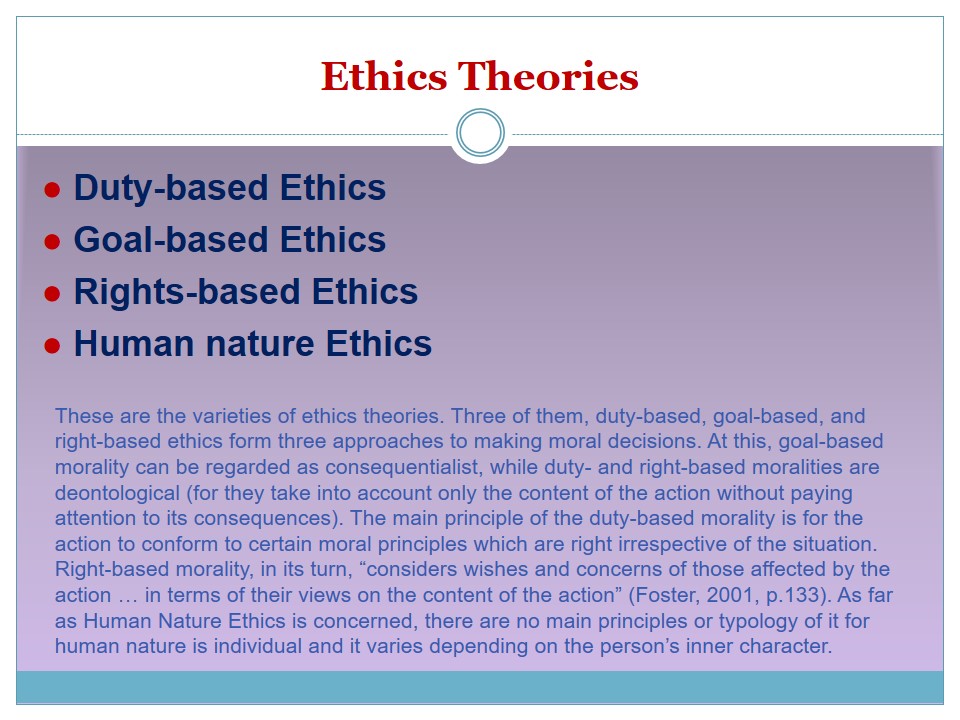
Duty-based Ethics
“Right- and wrong-making characteristics may be independent of consequences [and] morality is a matter of duty rather than of merely evaluating consequences” (Veatch & Haddad, 2008, p.10).
Sub-theory:
- Deontology (based on Immanuel Kant’s categorical imperatives).
The main focus of the duty-based ethics is rightness or wrongness of the action. It does not pay any attention to the consequences which this action has. This theory states that fidelity is more important than principles and that duty is above all. The act itself is considered to be right if the agent of this act fulfils his/her duty. Kant identified two categorical imperatives (universal applicability and respectful of others) which a person should be guided by when making a decision. In terms of universal applicability, a person is expected to treat all people equally irrespective of the situation. According to another imperative, people should not be treated as a means to an end, even if the agent’s intention is good.
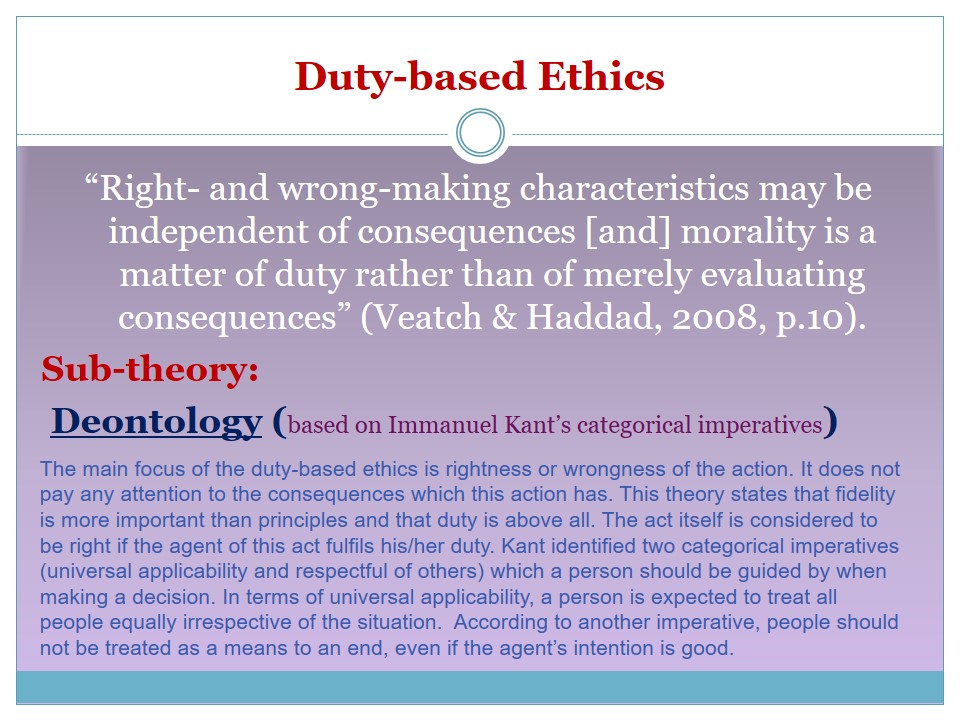
Goal-based Ethics
The action itself is of no importance for the agent; what matters is its consequence which necessarily has to be good. All the efforts of the agents are directed at the maximizing of the goodness of the consequence.
- Sub-theories:
- Consequentialism.
- Teleology.
Consequentialism can be regarded as a sub-theory of the goal-based ethics for the reason that they are focused on one and the same outcome. The same goes for teleology which is goal-oriented. Teleology can also be a sub-theory of goal-based ethics for it is also interested in the consequences of the action, rather than its content as such.
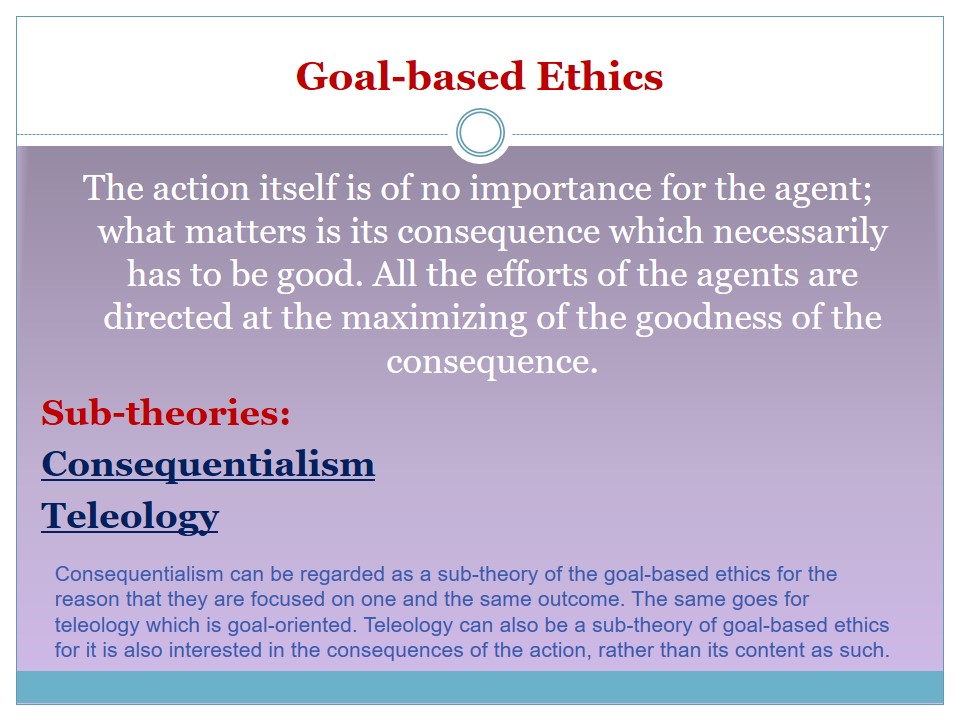
Right-based Ethics
“Right-based theories are […] concerned with the independence rather than the conformity of individual action. They presuppose and protect the value of individual thought and choice” (Cronin, 2002, p. 59).
- Sub-theory:
- Contractarianism.
Right-based ethics values the freedom of choice and is preoccupied with what the person him/herself considers right. According to Contractarianism, the basis of morality is the social contract between the government and the citizens which ensures the latter with inalienable rights. An ‘Original Contract,’ as stated by Kant is expected to determine what is the most just for the people. Thus, the idea of social contract is the basic for this theory.
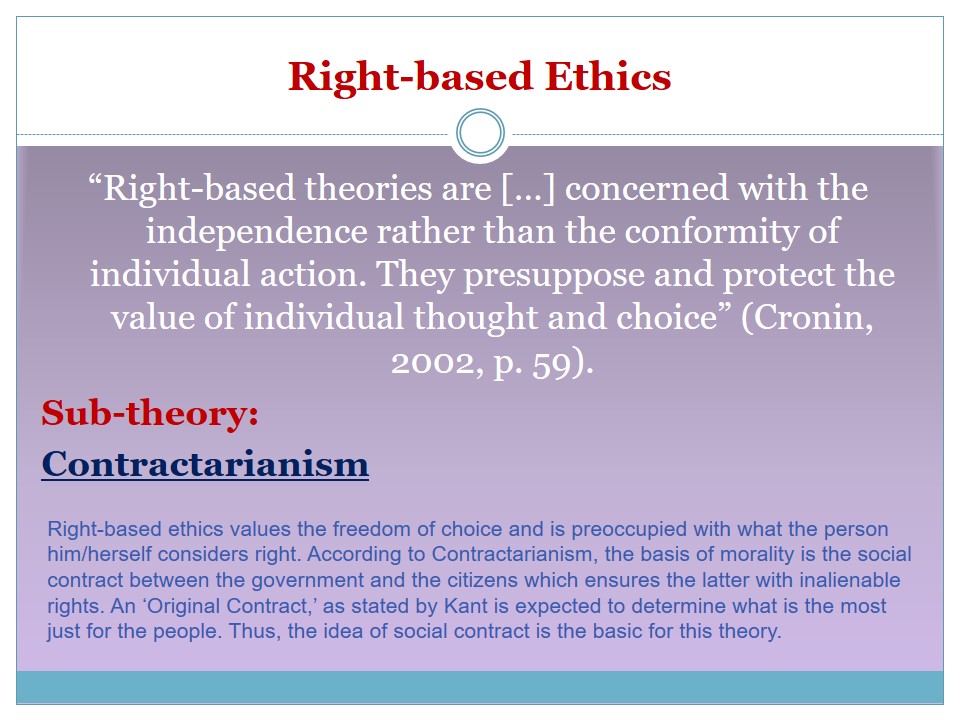
Human Nature Ethics
Human Nature Ethics is unique and within it human beings fulfill the role of those who define what is moral for them. Each person has moral principles he/she keeps to and it is impossible to dissuade him/her that these principles are incorrect.
Sub-theories: None.
Humans are the actors and they are valuable in themselves. Human Nature Ethics does not have any sub-theories in the light of the fact that they can be extremely diverse. Perhaps, Virtue Theory can be a sub-theory of Human Nature Ethics to some extent, but only if refers to Christian ideas of original sin and salvation. The basic principle of Human Nature Theory is for people to be happy with their decision.
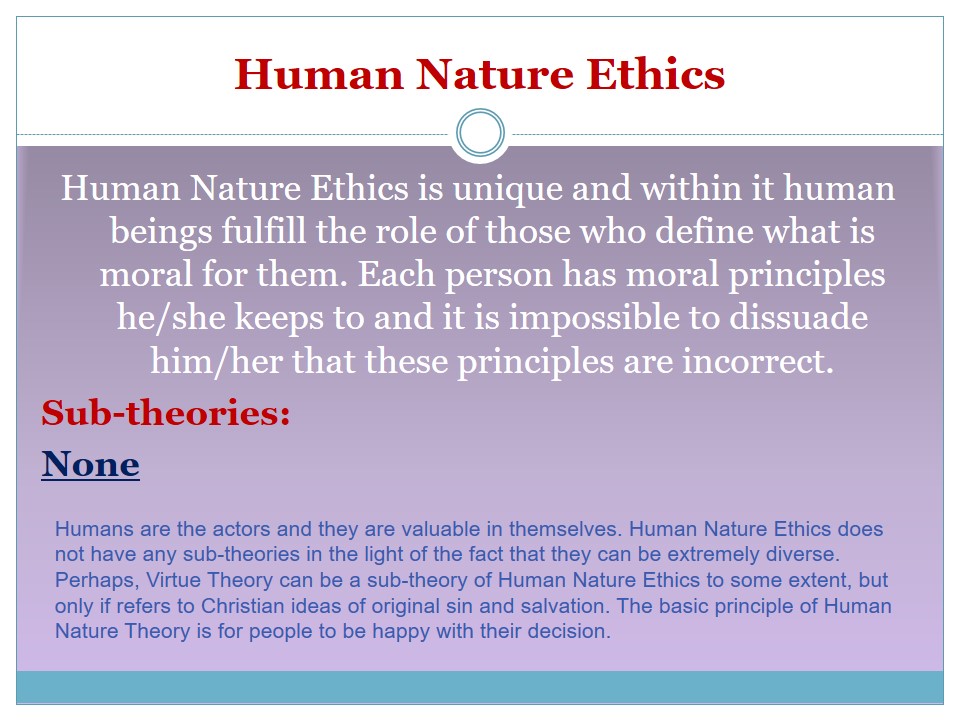
Real-World Examples to Ethical Theories
- Duty-based Ethics:
- I believe people should be able to eat sand because eating sand is the right thing to do.
- Goal-based Ethics:
- I believe people should be able to eat sand because it is good for their health.
- Right-based Ethics:
- I believe that if sand is going to be eaten, then it should be available for everyone to eat.
- Human Nature Ethics:
- I believe people should be able to eat sand if they like the taste of it.
It seems that the statement “I believe that people should be able to eat sand because eating sand is the right thing to do” can be referred to duty-based ethics since it claims that fulfilling the duty is the most important; this is why, if eating sand is the right thing to do, then it should be done. Similarly, the statement “I believe that people should be able to eat sand because it is good for their health” refers to goal-based ethics because it maximizes good consequences, and if eating sand is good for health, then people should eat it.
The statement “I believe that if sand is going to be eaten, then it should be available for everyone to eat” can be referred to right-based ethics because its main principle is keeping to the social contract, according to which government should take care about the citizens’ welfare; thus, if people can eat send, then it should be equally available to all of them. Likewise, the statement “I believe people should be able to eat sand if they like the taste of it” can be referred to Human Nature Ethics since it cares about the agents’ happiness in the first place.
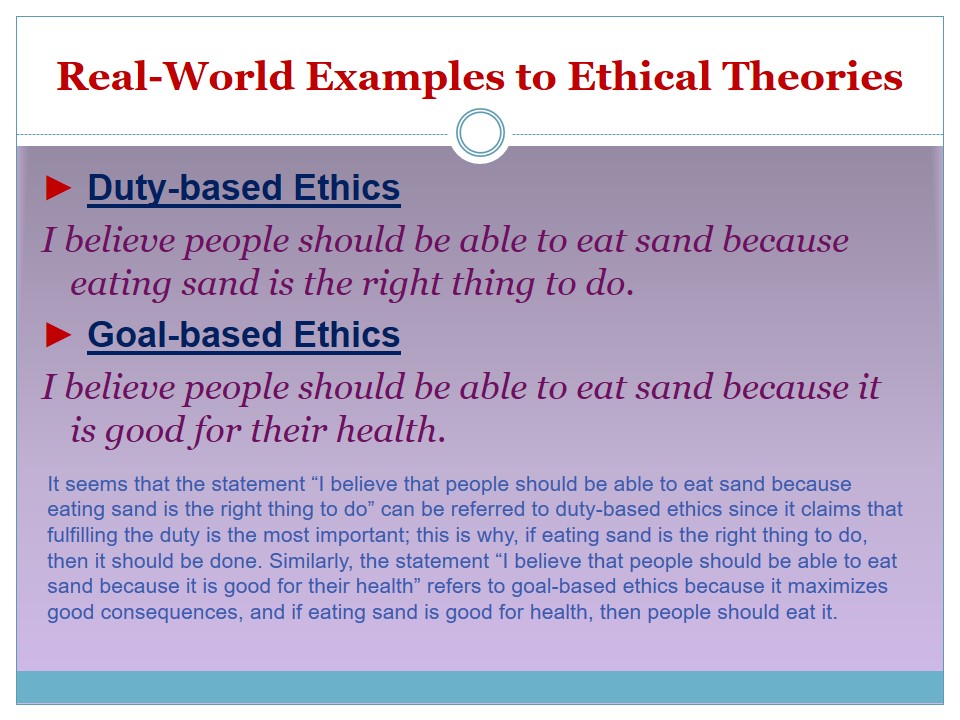
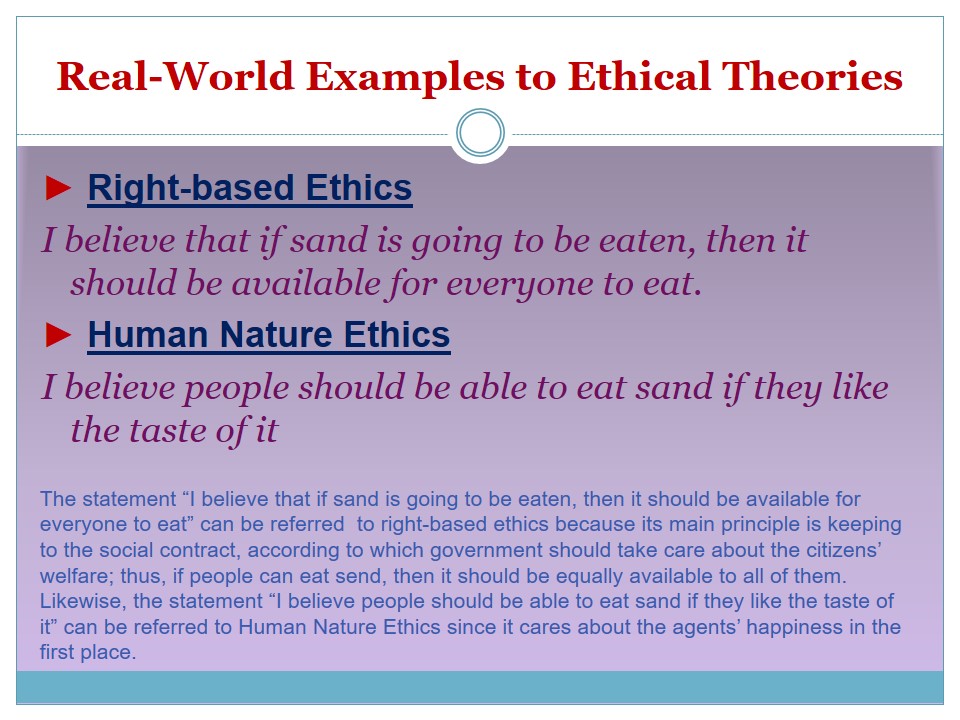
Workplace Examples
- Duty-based Ethics:
- The management of the company adopts policies which are of no benefit for the employees, but which have to be adopted for the company to function well.
- Goal-based Ethics:
- The company gives away some money for charity and the employees take part in distributing of this money among the orphanages. It does not solve all the problems which children face but it adds to the overall good and makes the employees feel better.
- Rights-based Ethics:
- A vacation is given to all the employees in the company and it is equally accessible to ordinary workers, to the managers and to the chief of the company.
- Human Nature Ethics:
- The company offers counseling to all the employees on the most various matters. The employees can either use it or consider it unnecessary for them. In any case, they rely on their inner needs or the absence of such.
These are the workplace examples to Duty-based, Goal-based, Rights-based, and Human Nature Ethics. These examples illustrate how these ethics can be applied in the company, firm, or any other organization.
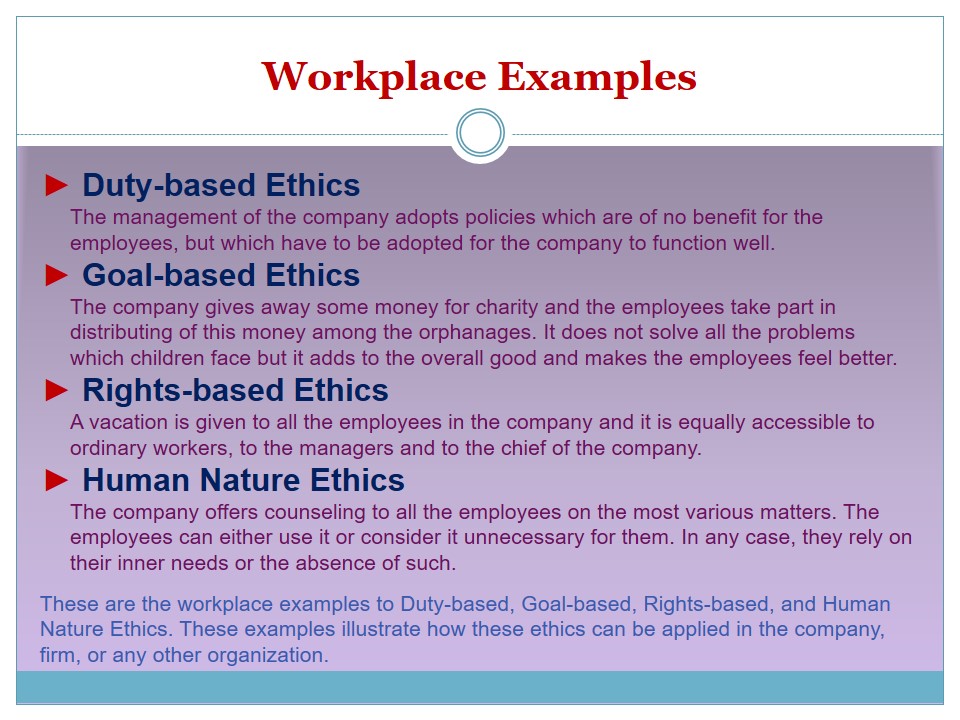
Reference List
Cronin, K. (2002). Rights and Christian Ethics. New York: CUP Archive.
DeRenzo, E.G. & Moss, J. (2006). Writing Clinical Research Protocols: Ethical Considerations. New York: Academic Press.
Foster, C. (2001). The Ethics of Medical Research on Humans. New York: Cambridge University Press.
Veatch, R.M. & Haddad, A.M. (2008). Case Studies in Pharmacy Press. New York: Oxford University Press US.
Wainwright, W.J. (2005). The Oxford handbook of Philosophy of Religion. New York: Oxford University Press US.